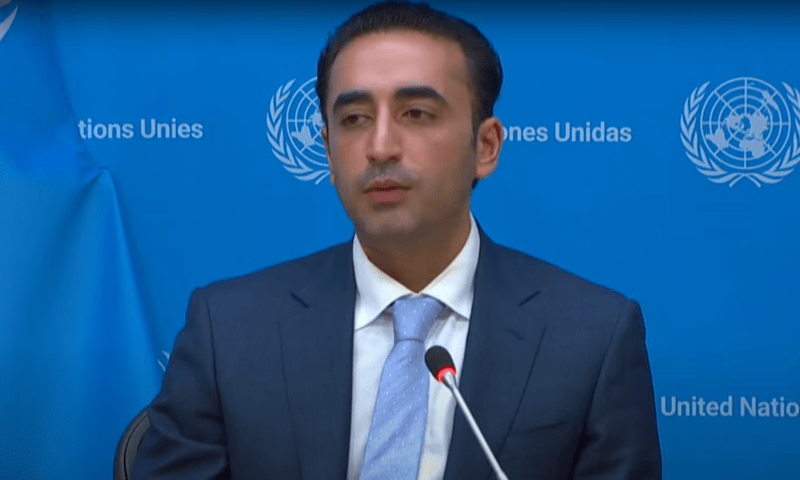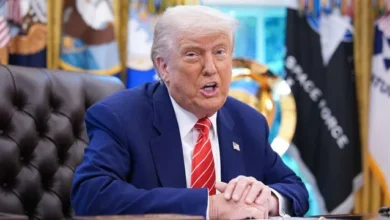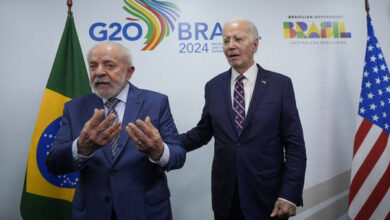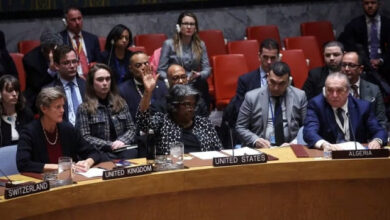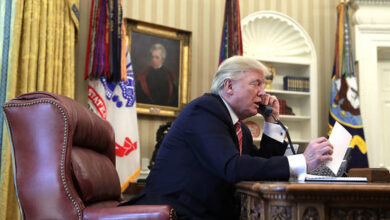PPP Chairman Bilawal Bhutto-Zardari on Tuesday urged the United Nations and the International community to push India towards a comprehensive dialogue with Pakistan, where the two countries could address their outstanding issues and achieve peace in the wake of their recent military conflict in the aftermath of the Pahalgam attack.
Bilawal was addressing a press conference at the UN Headquarters in New York on recent regional developments after the military conflict.
The address came amid the visit of a high-level team — consisting of three former foreign ministers, two former foreign secretaries, two former ambassadors to the US, and a serving federal minister — for consultations at the United Nations. The team arrived in New York on Sunday.
Ex-FMs Bilawal, Hina Rabbani Khar and Khurram Dastgir; Senators Sherry Rehman, Musadik Malik, Faisal Sabzwari and Bushra Anjum Butt; and Jalil Abbas Jilani and Tehmina Janjua are members of the delegation.
Bilawal said Pakistan’s position was to hold a “comprehensive dialogue” with India that would include the issue of terrorism as well. Bilawal said Pakistan was the country where the “single largest number of terrorist attacks” occurred and was also the country with the single largest number of victims of terrorism.
Bilawal said the Pakistani delegation was concluding its visit to New York and the UN and had appealed to the international community to assist the country in its pursuit of peace. “Just as the international community played its role in encouraging India to agree to a ceasefire, it should also encourage to engage in a comprehensive dialogue with Pakistan so that we can address our issues and achieve peace,” he added.
Bilawal said he wanted to use the opportunity to share Pakistan’s perspective on the recent military conflict with India in the wake of the Pahalgam attack, as well as the way forward.
Reiterating the “illegal strikes” launched by India as part of its ‘Operation Sindoor’ “in violation of the UN Charter, international law”, Bilawal said the attacks had targeted civilian infrastructure, places of worship, energy infrastructure and innocent women and children.
He said India had used the April 22 terrorist attack in occupied Kashmir’s Pahalgam as a premise for the strikes.
“We expressed our sympathy with the victims of terrorism and Pakistan has consistently and unequivocally condemned terrorism in all its forms and manifestations,” he said, adding that Prime Minister Shehbaz Sharif had immediately expressed Pakistan’s willingness to India and the global community to be part of any impartial international investigation.
“We did so because we were confident our hands were clean and we had nothing to do with this terrorist attack. The Indian government refused Pakistan’s offer and chose instead to conduct their illegal strikes.
“Pakistan only ever acted in self-defence, we never initiated any violence against India,” Bilawal said, adding that the Pakistani military had responded with precision the night of the first Indian attack and “only targeted and downed six planes because we believed those were the ones to release their load on Pakistan”.
He said India subsequently launched missile strikes into Pakistan in the next two days and the latter “responded in kind”. “Due to the intervention of the international community, and I’d like here to particularly mention the role of US President Donald Trump and his team led by Secretary of State [Marco] Rubio, we did manage to achieve a ceasefire,” Bilawal added.
He said the above was a “welcome first step” but was “only a first step”. “I must emphasise that the global community today is less safe post this ceasefire and conflict than we were before simply because the threshold for full-blown military conflict between two nuclear-armed states has come down, it has not gone up,” the former FM added.
“We’ve seen during the course of this conflict how quickly the escalation ladder between our two countries rose and the concern is that the next time there is such an incident, there may not be time for the international community to intervene before things get alot worse. That is why it is absolutely important for Pakistan and the international community to continue to pursue dialogue and diplomacy as the only viable path to peace.”
“The military and political leadership of Pakistan and the country are not the caricature that India would like to paint of us,” he said, adding that politicians had fought terrorists on the frontline and paid a heavy cost while the military had confronted them on the battlefield and earned their honours and promotions.
He also pointed out that the Financial Action Task Force — the international watchdog against money laundering and financing of terrorism — had endorsed Pakistan’s taking measures to combat terror financing.
“It’s become too easy for wannabe hegemons to use the wolf whistle of terrorism to justify illegal actions and violent actions in Muslim countries and communities,” Bilawal said, adding that terrorism could not be confronted by India while using it as a political tool to demonise Muslims within, in occupied Kashmir and Pakistan.
Despite that, he said Pakistan would still like to cooperate with India in combatting terrorism and the fate of the region’s people could not be left in the hands of non-state actors and terrorists for them to decide that two nuclear-armed powers go to war.
“This is the new normal or abnormal that the Indian government is trying to impose on the region that if there is a terrorist attack anywhere in India or occupied Kashmir, it means war with Pakistan.”
Bilawal said a reciprocal attitude would mean war with India and such a situation was untenable, adding that nuclear-armed countries could not go without dispute resolution mechanisms.
He said there should be a mechanism in which Pakistan and India could bring any complaints to a mutually agreed forum where both worked together to identify, track and deliver justice to terrorists.
“In addition to this, there is a root cause [which] in this case in occupied Kashmir is the unresolved agenda of Kashmir before the UN Security Council” and the promises made by the international community and India to Kashmiris.
“If we continue to ignore this issue and allow that wound to fester, there will forever be a bone of contention between India and Pakistan.”
In addition, he said the most recent front opened by India was the weaponisation of water, adding that the violation of the Indus Waters Treaty must be condemned across the board and the precedent must not be allowed to be set.
He said the threat to cut Pakistan’s water supply was a violation of the UN Charter and any action on it would be seen as an act of war by Pakistan.
The PPP chairman pointed out that India positioned itself as a net security provider, and yet “India’s actions have shown as a result of this conflict that they’re a source of insecurity, not a source of security for the region.
“The true net security provider for our region and beyond will be peace between India and Pakistan.”
He said Trump had a unique opportunity to deliver on his commitment to peace, enjoying good relations with both countries. He added the delegation would be beginning its engagements in Washington DC from tomorrow and encourage US lawmakers and government officials to play their role in facilitating the peace process.
The delegation separately met UN Secretary General Antonio Guterres and appreciated his proactive role in support of efforts for de-escalation and the offer of his good offices to advance dialogue and resolution of the Kashmir dispute.
The high-level team also briefed Ambassador Jerome Bonnafont, France’s permanent representative to the UN, about India’s aggression post-Pahalgam attack.
The Pakistani delegation is scheduled to arrive in Washington today, where it plans to engage with Rubio, other senior officials, lawmakers, and think tanks till June 6. The team will also visit London and Brussels. The visit coincides with the arrival of an Indian delegation in Washington on June 3, led by Congress MP Shashi Tharoor.
Yesterday, the nine-member Pakistani delegation held a series of meetings at the UN Headquarters.
It briefed the permanent representatives of the UNSC’s elected members besides itself — namely Algeria, Denmark, Greece, Guyana, Panama, Sierra Leone, Slovenia, Somalia and South Korea.
The group also engaged with envoys of the UNSC’s permanent members.
According to a statement by Bilawal after the team’s meeting with China’s Ambassador Fu Cong, the two neighbours agreed “aggressive posturing and unilateral actions threaten peace in the region and must be firmly opposed”.
In its briefing to Russia’s Ambassador Vasily Nebenzya, the delegation described India’s allegation as premature and lacking any credible investigation.
During the meeting with the United States’ UN envoy, Ambassador Dorothy Shea, Bilawal urged her country to play its role in ensuring comprehensive dialogue between India and Pakistan to address all outstanding issues.
Briefing to OIC representations
Earlier, the team met officials from the Organisation of Islamic Cooperation (OIC) officials to brief them on Pakistan’s stance.
Bilawal, while addressing the OIC Permanent Representatives, “categorically rejected India’s attempt to link Pakistan to the Pahalgam incident without any credible investigation or evidence”, according to a press release by Pakistan’s Mission to the UN.
He highlighted that the blame was “used as a pretext for unlawful military actions, including cross-border strikes, which targeted civilians and civilian infrastructure”.
During his meeting with the OIC envoys, PPP chairman expressed concern at India’s move to suspend the Indus Waters Treaty, which Pakistan considered “a blatant act of weaponising water and a violation of international and treaty obligations”.
“He [Bilawal] made it plainly clear that we cannot allow this to become a new normal,” the statement read.
It continued that the PPP chairman stressed that “due to India’s belligerent aggression, the world has become a less safe place, with real and present implications for peace and security in South Asia”.
The former foreign minister went on to thank the OIC for its efforts and role aimed at mediation to de-escalate tensions between the two nuclear-armed neighbours, highlighting that the “only path to peace is dialogue, engagement and diplomacy”.
“He [Bilawal] reaffirmed Pakistan’s commitment to peace, restraint, and diplomacy, and called for the restoration of the Indus Waters Treaty, full respect for the ceasefire, and the resumption of a comprehensive dialogue with India, with the resolution of the Jammu and Kashmir dispute at its core,” the statement read.
Meanwhile, the permanent representatives of the OIC countries expressed their “appreciation for Pakistan’s transparent and timely briefing and reaffirmed their solidarity with Pakistan and the people of Jammu and Kashmir”.
“They reiterated their concern over worsening security situation in South Asia and stressed the importance of upholding the principles of the UN Charter and international law and in this regard, the sanctity of treaties, including the Indus Water Treaty,” the statement added.
Separately, the delegation also held a meeting with the United Nations Security Council (UNSC) president for the month of June, Ambassador Carolyn Rodrigues-Birkett, who represents the Republic of Guyana.
The delegation emphasised that in the face of a growing trend of unilateralism and escalation, the UNSC must play its crucial role to ensure peace and conflict resolution.
It urged the UNSC to play a proactive role in promoting de-escalation, ensuring respect for international law and treaties and facilitating peaceful resolution of the disputes, including the Jammu and Kashmir dispute, in line with the Council’s resolutions.
Ambassador Rodrigues-Birkett reaffirmed the UNSC’s commitment to upholding international peace and security in line with its mandate.
Separate delegation briefs Russian FM
Separately, Special Assistant to the Prime Minister (SAPM) Syed Tariq Fatemi called on Russian Foreign Minister Sergey Lavrov upon the former’s arrival in Moscow this afternoon and briefed the Russian diplomat in detail about the recent developments in South Asia, according to a statement from the Embassy of Pakistan in Moscow.
Fatemi conveyed Pakistan’s perspective on the dangers of escalation as well as the dire consequences of India’s threat to reduce the flow of the Indus Waters Treaty, by holding the treaty in a so-called “abeyance”.
While discussing Pakistan-India relations, Lavrov stressed Russia’s support for the promotion of normal relations between the two countries and its positive effect in the region.
The SAPM conveyed Prime Minister Shehbaz Sharif’s good wishes and the desire of the Pakistani leadership to expand bilateral cooperation with Russia across a wide array of subjects, including energy, connectivity, trade, among others.
Lavrov expressed satisfaction over the steadily growing bilateral cooperation with Pakistan, placing particular emphasis on important projects, such as the establishment of new steel mills as well as the connectivity projects.
He also stated that Russia looked forward to working closely with Pakistan, within the framework of the Shanghai Cooperation Organisation, especially in the field of counter-terrorism.
SAPM Fatemi also delivered PM Shehbaz’s letter addressed to President Vladimir Putin.

